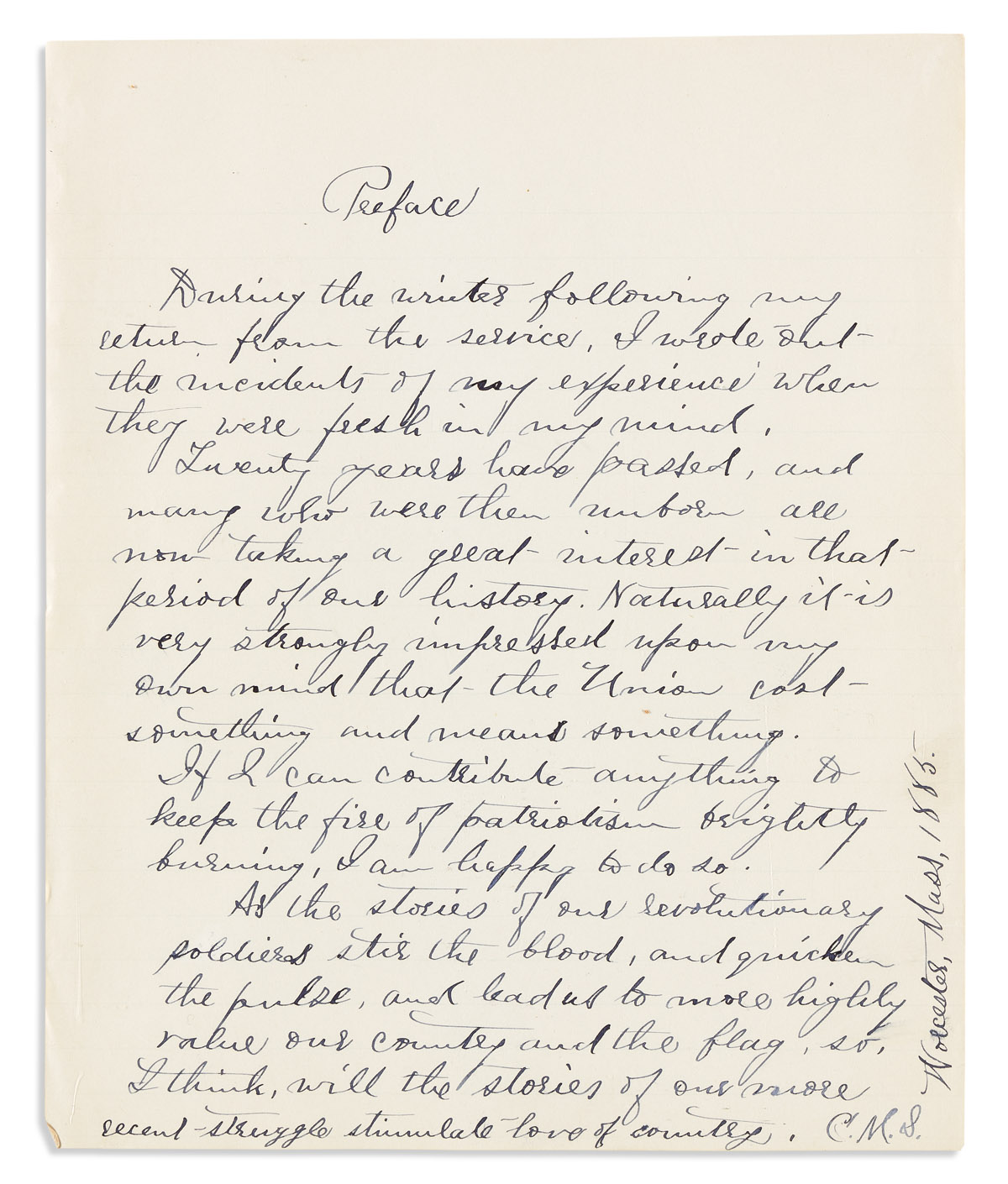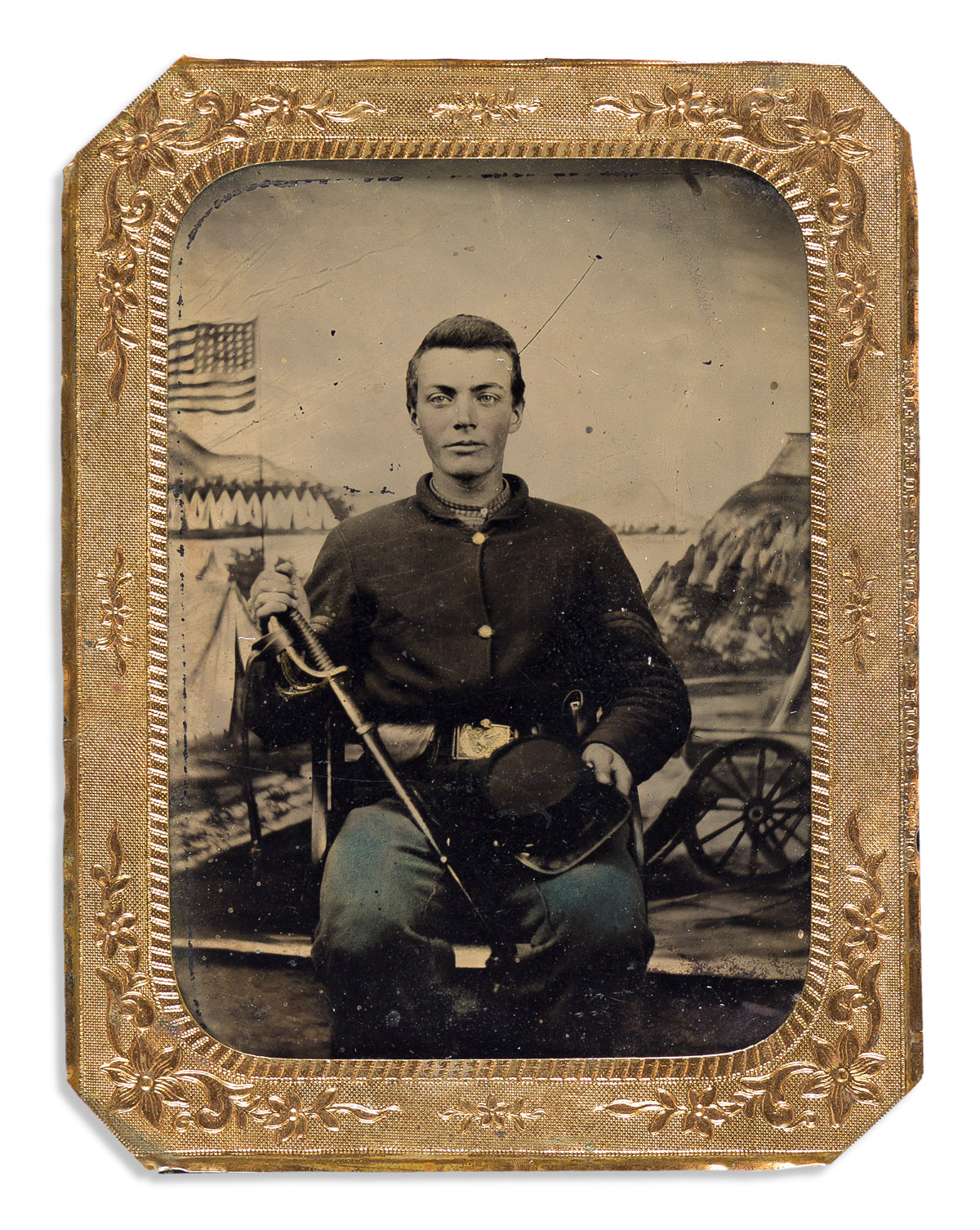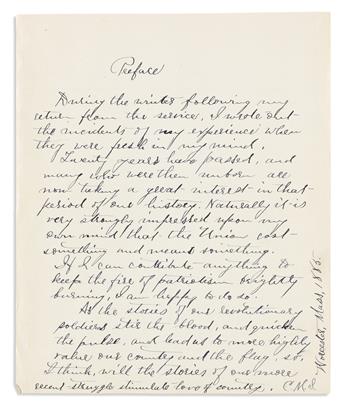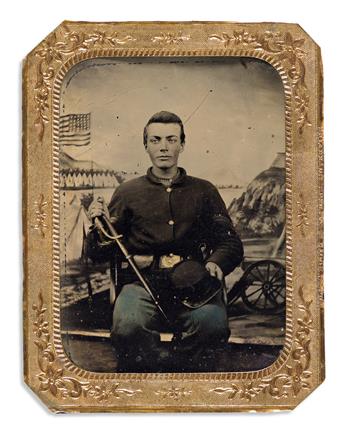Sale 2600 - Lot 79
Unsold
Estimate: $ 1,500 - $ 2,500
(CIVIL WAR--MASSACHUSETTS.) Charles M. Smith. "What It Cost, or One Soldier's Experience," an unpublished memoir of cavalry life. [4], 62 unbound manuscript pages on lined paper detached from a notebook, 9 3/4 x 7 1/2 inches; toning to title page, final leaf worn without loss of text. Worcester, MA, 1885
Additional Details
Charles Mather Smith (1842-1908) served as a corporal in the 1st Massachusetts Cavalry Regiment, which was present at several of the major battles of the war. The first extended portion of his memoir takes place on Beaufort Island, which his company occupied in January 1862. Wealthy planters had deserted their summer homes upon their approach, smashing and defacing their opulent furnishings as they left, "not willing that it should benefit our people" (page 4). The regiment was sent northward for the Maryland campaign, and saw their first heavy action at Antietam (pages 11-12), where his regiment supported an artillery battery which had crossed the Middle Bridge: "I never saw men work as those gunners did for about two or three hours, but they finally succeeded in silencing the enemy." He visited the battlefield and its fresh graves two weeks later, poignantly described in a note to page 15.
Smith's company was detailed for a "daring little feat" on 17 October, a reconnaissance to the village of Smithtown where they just missed intercepting General Lee with his staff on a country road (pages 20-23). Smith's horse collapsed from this effort, and he pays the loyal beast a touching page-long tribute. He visits Harpers Ferry and reflects on John Brown's courage as well as the "wildest, grandest and most impressive" scenery (page 25). He describes hand-to-hand sabre combat at the Battle of Brandy Station, with Confederate officers shouting "Charge them! They are nothing but Massachusetts hirelings!" This was followed immediately by the Battle of Aldie which wiped out most of the 1st Massachusetts: "In about twenty minutes we had lost 154 killed wounded and missing. . . . I escaped unharmed, with the exception of a piece of flesh being cut from my finger, as I suppose, by a ball" (pages 47-49). His decimated regiment was held in reserve at Gettysburg two weeks later, but he reports on the "continual unbroken roar" which "seemed as if the elements of nature were convulsed" (page 50). The memoir ends with the 14 October 1863 Battle of Auburn, where a shell killed Smith's horse instantly. He soon found a member of his company whose "side had been shot away by a shell which passed thro' a man just in front of him. He died in about half an hour, and I mounted his horse and joined the company." Smith was captured the following month at the Battle of Mine Run and sent to Andersonville. He told that portion of his story in a separate narrative not included here: "From Andersonville to Freedom," published by the Rhode Island Soldiers and Sailors Historical Society in 1894.
The present memoir was originally written "during the winter following my return from the service," which would be the early months of 1865. The present manuscript is a clean transcript in an unidentified hand, with numerous revisions in Smith's hand, as well as a new preface in his hand signed and dated 1885. The preface explains his motivation to instill the same kind of patriotism as the Revolutionary War narratives of his youth: "It is very strongly impressed upon my own mind that the Union cost something and meant something. If I can contribute anything to keep the fire of patriotism brightly burning, I am happy to do so."
WITH--a complete modern typed transcription of "What It Cost"; an 8-page typed tribute to Smith by John H. Jewett titled "Our Comrade Charles Mather Smith, a Sketch for By and By" dated 1901; and a lightly hand-colored uncased tintype portrait of Smith, 4 x 3 1/4 inches including frame, with paper caption label on verso and only minor wear.
This expansive memoir has apparently never been published, but has more than enough original historical detail and literary flair to warrant publication. Smith clearly wanted to share his story with the world, and it is not too late.
Smith's company was detailed for a "daring little feat" on 17 October, a reconnaissance to the village of Smithtown where they just missed intercepting General Lee with his staff on a country road (pages 20-23). Smith's horse collapsed from this effort, and he pays the loyal beast a touching page-long tribute. He visits Harpers Ferry and reflects on John Brown's courage as well as the "wildest, grandest and most impressive" scenery (page 25). He describes hand-to-hand sabre combat at the Battle of Brandy Station, with Confederate officers shouting "Charge them! They are nothing but Massachusetts hirelings!" This was followed immediately by the Battle of Aldie which wiped out most of the 1st Massachusetts: "In about twenty minutes we had lost 154 killed wounded and missing. . . . I escaped unharmed, with the exception of a piece of flesh being cut from my finger, as I suppose, by a ball" (pages 47-49). His decimated regiment was held in reserve at Gettysburg two weeks later, but he reports on the "continual unbroken roar" which "seemed as if the elements of nature were convulsed" (page 50). The memoir ends with the 14 October 1863 Battle of Auburn, where a shell killed Smith's horse instantly. He soon found a member of his company whose "side had been shot away by a shell which passed thro' a man just in front of him. He died in about half an hour, and I mounted his horse and joined the company." Smith was captured the following month at the Battle of Mine Run and sent to Andersonville. He told that portion of his story in a separate narrative not included here: "From Andersonville to Freedom," published by the Rhode Island Soldiers and Sailors Historical Society in 1894.
The present memoir was originally written "during the winter following my return from the service," which would be the early months of 1865. The present manuscript is a clean transcript in an unidentified hand, with numerous revisions in Smith's hand, as well as a new preface in his hand signed and dated 1885. The preface explains his motivation to instill the same kind of patriotism as the Revolutionary War narratives of his youth: "It is very strongly impressed upon my own mind that the Union cost something and meant something. If I can contribute anything to keep the fire of patriotism brightly burning, I am happy to do so."
WITH--a complete modern typed transcription of "What It Cost"; an 8-page typed tribute to Smith by John H. Jewett titled "Our Comrade Charles Mather Smith, a Sketch for By and By" dated 1901; and a lightly hand-colored uncased tintype portrait of Smith, 4 x 3 1/4 inches including frame, with paper caption label on verso and only minor wear.
This expansive memoir has apparently never been published, but has more than enough original historical detail and literary flair to warrant publication. Smith clearly wanted to share his story with the world, and it is not too late.
Exhibition Hours
Exhibition Hours
Aliquam vulputate ornare congue. Vestibulum maximus, libero in placerat faucibus, risus nisl molestie massa, ut maximus metus lectus vel lorem.






